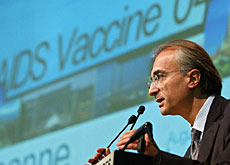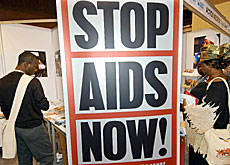
Scientists develop new weapon in fight against HIV

Researchers in Geneva have developed a new molecule which blocks the transmission of HIV, the virus that causes Aids, during sexual intercourse.
The molecule proved effective in tests with monkeys, and human trials could start within the next year.
The molecule, called PSC-Rantes, was developed over seven years by a team working at the faculty of medicine at the University of Geneva.
The results were due to be published in the prestigious American journal, “Science”, on Friday.
What makes PSC-Rantes viable for use in humans is that it can be used as a microbicide – a substance that can be applied to the genital organs to prevent the virus from entering the body during sex.
Scientists have so far tested the molecule on monkeys at a laboratory in Louisiana in the United States.
“To my knowledge this is the first time that a biological agent has in an experiment with monkeys protected all the members of a group against infection by the virus,” said Robin Offord, who headed up the project.
Offord said the next step would be to test whether this molecule or an improved version of it could be tolerated by human beings.
Developing world
The team hopes that the discovery could eventually be used in the developing world which, Offord says, currently accounts for 95 per cent of HIV infections.
One reason for the high prevalence in poorer countries, says the professor, is that men often refuse to use condoms. An effective microbicide would allow women to protect themselves against HIV infection, when their partners won’t use a condom.
“The use of microbicides is more under the control of the woman than the man,” Offord told swissinfo.
“[Using a] condom, on the other hand, has to be negotiated and often those negotiations are unsuccessful, particularly in parts of the world where women don’t really have very much say in what happens with their own sexuality,” he added.
Offord adds that the microbicide would ideally be used with a condom to ensure better protection.
Promising
Giuseppe Pantaleo, head of Lausanne University Hospital’s immunology department and at the forefront of research into the development of an Aids vaccine in Switzerland, said the research was promising.
He said that there had been a lot of work in the area of microbicides and that the field was developing very fast.
“This science paper is very important because it is probably one candidate with a very solid scientific background as compared with a lot of other candidates where the scientific background is quite weak,” Pantaleo told swissinfo.
“It’s a product that will probably deserve clinical development and this is the way that we really need to go,” he added.
Challenges
Offord said tests on humans could take place within a year. The team will also be looking at ways to reduce the cost and dosage level of the substance.
The original aim had been to make a very powerful product for use in small doses, which should have make it less expensive for developing countries. But so far, larger amounts have been needed in tests.
“So the two next things are to go on testing the material for safety at the same time as trying to reduce the dose and reduce the cost,” Offord told swissinfo.
But he added that the process would take time, and that it would be “several years” before a version of the microbicide could reach the market.
swissinfo, Isobel Leybold-Johnson
38 million people worldwide are living with HIV.
Nearly two thirds of them live in sub-Saharan Africa.
South Africa has the highest number of infections in the world – an estimated five million.
Botswana and Swaziland have the highest proportion of HIV-positive people.

In compliance with the JTI standards
More: SWI swissinfo.ch certified by the Journalism Trust Initiative







































You can find an overview of ongoing debates with our journalists here . Please join us!
If you want to start a conversation about a topic raised in this article or want to report factual errors, email us at english@swissinfo.ch.